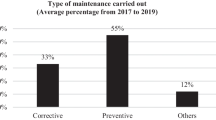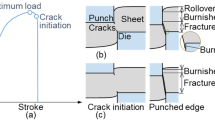Conclusions
-
1.
Productivity of the unit for deformation-free hardening of races is limited by cooling rate of the quenching agent (industrial oil I20-A). With a requirement for obtaining a productivity of >1000 parts/h of bearing races 100–200 mm in diameter with a 3–5-mm wall thickness, soaking time in the calibrating equipment should be increased.
-
2.
In order to obtain a saving due to a reduction in grinding tolerances, the precision for all turning parameters should not be worse than 0.05–0.07 mm.
-
3.
In evaluating the possibilities for using units of this type in specific factories, particularly in production lines, it is necessary to consider their limited productivity and lower reliability compared with electric furnaces (maintenance shutdowns occur not less than once every 2 days).
Similar content being viewed by others
Literature cited
Yu. A. Geller, Tool Steels [in Russian], Metallurgiya, Moscow (1968).
A. G. Spektor et al., Structure and Properties of Bearing Steels [in Russian], Metallurgiya, Moscow (1980).
Additional information
State Bearing Factory No. 2. Translated from Metallovedenie i Termicheskaya Obrabotka Metallov, No. 10, pp. 48–50, October 1981.
Rights and permissions
About this article
Cite this article
Zhigal'tsov, A.G., Syropyatov, V.Y. Experience of operating a unit for low-deformation heat treatment of races with induction heating. Met Sci Heat Treat 23, 718–719 (1981). https://doi.org/10.1007/BF00712414
Issue Date:
DOI: https://doi.org/10.1007/BF00712414




